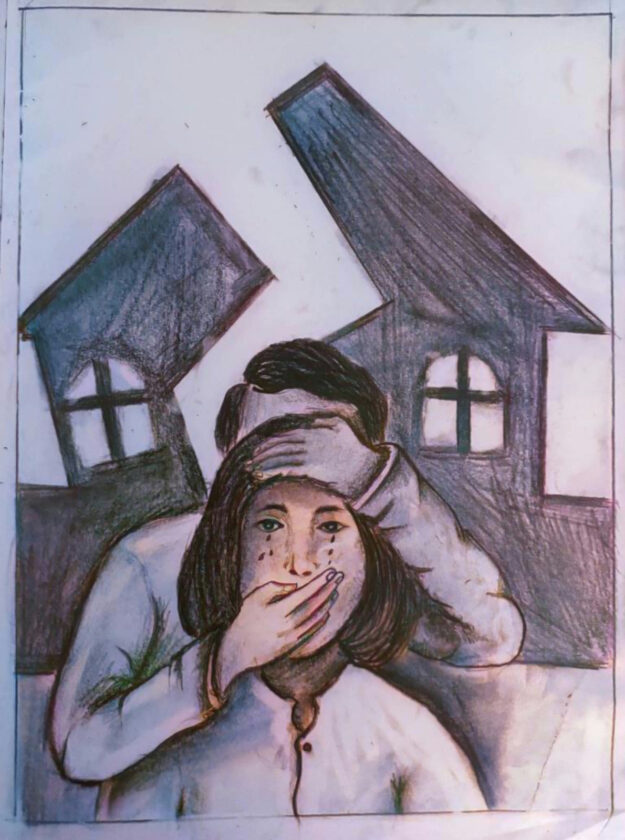Kantarawaddy Times
Carrying as much as she can, moving from house to house in the village, selling clothes and a bit of gold, this is the daily life of 28-year-old Mu Lunn (name changed).
On the outside, Mu Lunn appears like any other young woman who is beautiful, lively, and full of energy. But behind this appearance, she is a married woman who is a victim of domestic violence.
Struggling to make a living, Mu Lunn always has to put on a smile while interacting with customers. Yet, beneath this forced smile, she hides deep emotional wounds that most people wouldn’t notice at a glance.
She revealed that even before completing a year of marriage, she had already begun experiencing physical domestic abuse from her husband.
“He (my husband) would go out gambling and return home at midnight. Then he would order me to kneel and massage his feet. It happened every day, and when I couldn’t endure it anymore and spoke back, he got angry and punched me five times on the head,” Mu Lunn recounted the beginning of the abuse.
But it didn’t stop there. She later experienced more severe physical violence, including being hit on the head with a brick and being strangled.
“When I was physically abused, I felt deep pain and resentment inside,” she admitted.
Sometimes, Mu Lunn’s husband would even physically assault her in front of his parents. Instead of stopping him, his parents blamed her, making her feel completely isolated and helpless.
Although Mu Lunn’s parents once tried reporting the abuse to the village elders, the male-dominated society meant that their efforts were ignored, like “sticking a spear into the ground.”
When she tried escaping to her parents’ home, her husband would follow her, shouting and causing disturbances. As these incidents became frequent, even Mu Lunn’s mother began to feel burdened to let her daughter stay at home.
With no way out, Mu Lunn finally decided to run away. Two years ago, while pregnant with her second child, she grabbed her son’s hand and fled.

Fortunately, with guidance from trusted connections, she found support from a Gender-Based Violence (GBV) prevention organization called ‘Safe House’ and was able to safely give birth to her daughter.
Due to the ‘Safe House’ limited capacity, she had to leave after a year and return to her hometown in western Demoso. With no other options and due to village customs, she ended up reuniting with her husband.
Like “bowing down even when unwilling,” Mu Lunn was forced to live under the same roof with her abuser. However, village rules stated that if a couple divorced, their children would be separated between them.
Not wanting to be apart from her children, Mu Lunn chose not to leave.
“I worried that separation might emotionally harm my kids. So I thought, ‘Maybe he will change a little,’ and I wanted my children to have a father,” she explained.
Currently, Mu Lunn still lives with her husband. Although she no longer suffers physical abuse, there is no warmth in their relationship.
When her husband comes home drunk and starts making trouble, she just quietly avoids him.
Many women in Karenni State are in similar situations, suffering from domestic violence in almost every village. Some don’t even realize they are victims.
“A lot of women only recognize physical violence as domestic abuse. But in reality, they also suffer from emotional abuse without even knowing it. Many are ashamed of what they’re going through and stay silent. Cultural traditions have also led to generations of women being treated as second-class citizens. Some even blame themselves for being abused. The idea of reporting the abuse to organizations seems far-fetched to them,” said a GBV prevention activist.
In 2024, more than 40 cases were reported to the Women and Child Affairs Department of IEC, with domestic violence being the most common.
With the current political instability and weak rule of law, domestic violence and other forms of abuse continue unchecked, giving perpetrators a sense of freedom.
“Those who commit offenses are acting as if they can do whatever they please. There is a growing mindset among them that even if they commit crimes, there is no authority to arrest or hold them accountable,” said Maw The Mar, the deputy director of the Women and Child Affairs Department.
The IEC is currently working towards the enactment of a law to protect women. It has been stated that women have faced discrimination across generations, and it is crucial to collectively resist and eliminate such discriminatory practices.
Mu Lunn believes that awareness programs on gender equality should not only target women but also educate men.
Like Mu Lunn, many married women and children in Karenni State continue to suffer from domestic violence. Having endured years of abuse, Mu Lunn is now ready to report if it happens again.
She also encourages other victims not to suffer in silence but to seek help from relevant organizations.
Reflecting on her four years of marriage, she said, “I gave birth to my children, but I never really experienced the warmth of family.”




